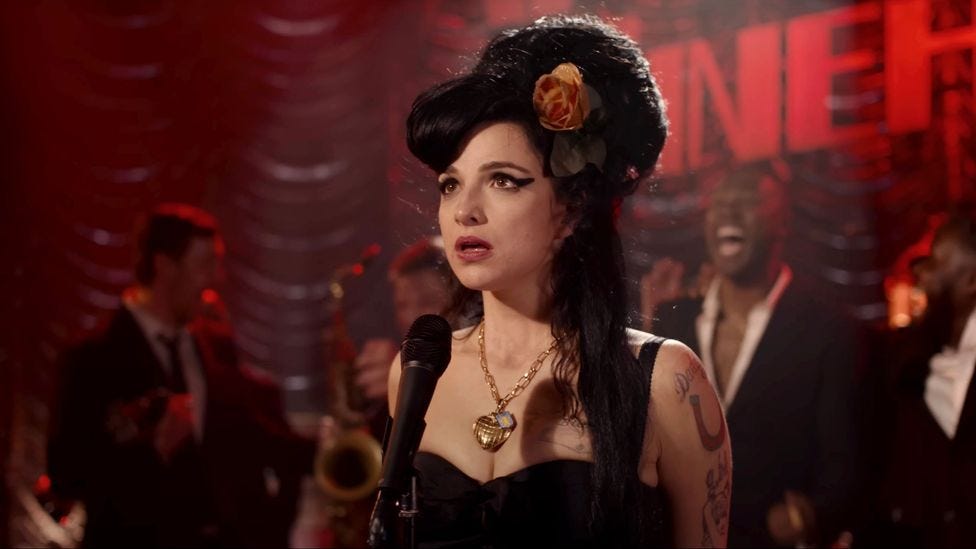Amy Winehouse is an enigma. She didn’t rise to fame overnight, but when she did it was like a bomb going off. She won five Grammys in 2007 on the strength of her iconic album, Back To Black and then passed away from an alcohol overdose in 2011 after an attempt at sobriety. Does the new film, Back To Black make sense of the chaos that was Amy Winehouse’s life? Aside from some strong performances, no, not really.
The movie covers all the main points of Amy’s life, starting with her pre-fame period, when she was singing “Fly Me To the Moon” at family gatherings and looking through her grandma’s memory box, but it quickly zooms into her rise to fame and descent into drugs and alcohol, although we don’t know how. We see the tumult. We see the destructive co-dependency with her husband, Blake, after initial blissful happiness and starry-eyed wandering around the London Zoo. We see plenty of violent freak-outs.
We also see plenty of seemingly pensive scenes where Amy leans on her dad and misses her grandma, apparently wondering what she’s made of her life. None of it is enough, though, to stop what we all know is coming to her. The world both enabled Winehouse’s tragedy and exploited it as trendy and iconic, but in the end she may have been her own worst enemy.
Back To Black unfortunately falls into the usual biopic trap of skimming over the top of a remarkable life, maybe because there’s already been so much said about Winehouse in the press. I kept wishing the movie would settle on something. It would have been great to peek inside her creative process and how her grandma influenced her musical style. Or focus on the close relationships Winehouse had, such as with her dad, or Blake, or her grandma. How did she go from being a loving, relatively well-adjusted aspiring musician to a deeply dependent addict?
None of those questions are answered with any kind of substance, and what’s there feels somewhat sanitized. Not that the movie had to go full-on Requiem For A Dream, but we should have gotten more of a sense of how devastating Winehouse’s vices really were both to her and everyone around her. As it is, the film seems to mark time by showing Winehouse getting another tattoo.
The movie’s real strength, though, is in Marisa Abela, who plays Amy. For the most part, she does her own singing in the film and puts in a remarkable approximation of Winehouse’s style, albeit with a lighter tone. I followed up seeing the movie by listening to the Back To Black album and felt all the chills because I could hear what Abela must have done to make her Amy happen. It must not have been easy, especially considering the dedicated fandom that still surrounds Winehouse’s memory.
The few times I saw Amy Winehouse on TV, it always struck me that she was barely coherent, either from her accent or the drugs, but once she started singing, everything became clear, and the Back To Black album itself is an amazing piece of work. I wish I could say her new biopic lets us into her life, but in the end it’s too typical a biopic to really tell her story.
Back To Black is currently in theaters. Rated R.
My grade: B
Principal Cast: Marisa Abela, Eddie Marsan, Jack O’Connell, Lesley Manville, Juliet Cowan, Sam Buchanan, Pete Lee-Wilson, Thelma Ruby, Michael S. Siegel, Matilda Thorpe, Anna Darvas, Tracey Lushington, Ryan O’Doherty, Spike Fearn, Harley Bird, Francesca Henry, Liv Longborne, Tuwaine Barrett
Directed by Sam Taylor-Johnson
Written by Matt Greenhalgh.




